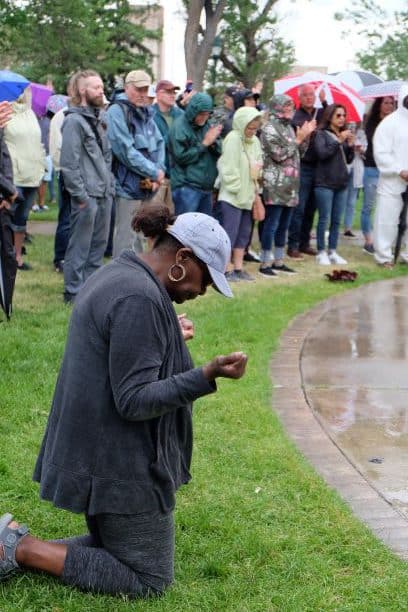National African American Missions Conference Report – Day 2


At times, African Americans have been denied access to joining in cross cultural missions but now have a special opportunity to pursue justice abroad and not just at home. All of the church and nonprofit world can pursue justice and healthier dynamics within their teams and in the work they do among the world’s unreached people. And women can be part of leading the way in all of the related complexities and opportunities as natural “healers” who also understand suffering.
These were some of the messages of the speakers for the second day of the online National African American Missions Conference. Many urged further conversations in both black and white communities, churches and organizations around these issues. And they recognized of the need for the cost to all Christians, and the beauty when they come together, to reach people with the Gospel.
“I want to say to any of us who see injustice in the world, there is not a free way to deal with injustice,” said Lily Field, executive director of Ambassadors Fellowship, an African American sending agency. She’s also been a missionary for 17 years to both Haiti and various Muslim populations. And she mentors other African American global workers.
She led a workshop titled, “Missions, Justice, and Black Lives Matter,” on Friday. Speakers from all over the world led workshops on fund-raising, how COVID-19 is changing missions, tentmaking, prison ministry, ministry to deaf populations, conversations around Bible translation, what the black church can specifically offer Asia, how to engage and clear pathways for women in ministry, spiritual warfare and missional churches.
As it stands, many organizations “have a missions structure that comes out of a white experience and then say, ‘now let’s try to recruit African Americans into this structure,’” said Field.
Speakers also brought up many of missions’ many complex subjects, inviting questions, various perspectives and conversations around issues such as how mission narratives have left out people of color, how competition among teammates and organizations creates divisions, and how power dynamics on teams and with cultures that are served put up hurdles to the Gospel. The vision, though, of healthy multicultural teams, including both women and African Americans, who use their own backgrounds of suffering to connect well to the suffering around the world, was cast again and again by various speakers.
“When we are one, together on His global mission, what is the world going to see?” asked Sophia Wang, a mobilizer with Send International. “The world is going to see that He is king.”
“We haven’t always done this very well,” said Dave Hall, international director for TEAM. “I’m very committed to learning and growing and seeing how we can make more open pathways for the whole body of Christ.”
Despite the fact that African Americans have a rich but little-known history of missions, especially in the 1800s, many around the world today picture American blacks in the role of sufferer, victim, rioter, and perpetuator of violence, said Field. The white experience, particularly in short-term missions tends to glorify missions. But the reality of the suffering African Americans have endured and a life of navigating cross cultural situations as a minority in America gives them advantages in overseas missions work, she said.
“We have had a traumatic history,” she said. “But it’s not in vain. God has given us that history so we can speak to other people.”
And increasing the presence of African Americans is a way to truly show that black lives matter, in a way that uplifts black lives.
“Most of the mission programs look the same and most of the mission flyers, the pictures, and images are of white, western wealthy people taking care of poor people of color,” she said.
Field reported that just 250 to 400 African Americans out of the population of 40 million are currently long-term missionaries. While racism is a problem that consumes hundreds of years, populations’ lack of access to the Gospel is an eternal one, and needs African Americans’ involvement, she said.
People could someday say, “When I think of a black person, I think of that person who brought the Gospel,” she said.
But history’s hurts among and between races should not be ignored or discounted on teams, she said.
“How many times as a missionary was I was disciplined for being racist?” Field said. She shared a painful experience of serving as the only African American on an otherwise white team early in her ministry. She would hear white missionaries talking negatively about locals and call them out, asking them, “why did you call them, ‘those people.’ (My boss said), ‘You made the white people uncomfortable.’ And I was called to repent. We have to talk about these issues. Where is there a place for reconciliation? Where is there a place for repentance in the systemic missions culture? How do we restore long-standing broken relationships?”
She urged workshop attendees to reimagine not only reshaping how mission organizations involve African Americans, but also how they do missions period: less “white savior” narrative, more cultivating of equal friendships, training and empowering programs for the poor and relating to the poor’s trust in God and not in resources. She also spoke from personal experience about how big the problems are in many contexts overseas, with few easy answers.
Women have been largely missing from positions of leadership, pointed out Wendy Wilson, executive director of Women’s Development Track, which provides training for women in ministry and women in leadership for the missions community. She laid out the need and vision for bettering male-female partnerships at all levels of ministry, inviting more conversations within organizations around female leadership.
“How can we catalyze better processes to find, develop, support and retain gifted women who bring needed perspective and talent to our organizations?” she asked attendees of her workshop, titled “Missional Women: Pursuing Pathways for Women in Leadership.”
Keynote speaker Star Nelson, co-founder of Seeds for Joy, called women “missing gap providers.”
“People need healing,” she said. “Women are good at healing. Usually we’re good at taking care of people. I think we do have a place in this process.”
She is due to return on Saturday to share more of her vision for women in missions. She has also organized an online meeting next Saturday, July 18 at 10 a.m. central time, for women who want to discuss missions. Look for information on recordings of workshops and other links on NAAMC’s site: https://www.naamcevents.org/
Also on Saturday, speakers will look toward the future of missions, impacted by calls for social justice, which conference organizer Adrien urged learners to remember “though social justice doesn’t replace the Gospel, it is part of the Gospel.” And COVID-19 is also impacting missions going forward. The event is “sold out” but organizers are streaming sessions on Facebook and have put more free registrations on its site.
This article is submitted by Rebecca Hopkins of Paraclete Mission Group. Paraclete Mission Group is a Missio Nexus member. Member organizations can provide content to the Missio Nexus website. See how by clicking here.


